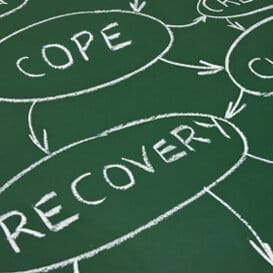

By: Lakeview Health
Preparation
A preliminary game plan, referred to in drug rehab as a discharge plan, is essential to decrease the risk of relapse when returning home. The anticipation of returning home after completing treatment may create a sense of excitement. This feeling, although positive, should also be considered a trigger and an addict should remain vigilant about the disease of addiction. The preparation for returning home should include:
- A list of local support group information with first meeting attendance already planned.
- Listening to suggestions by following through with treatment discharge plans.
- A relapse prevention plan tailored to individual triggers, thoughts and behaviors.
Having a stable support network around you will help you be open and honest about specific warning signs and behaviors of relapse.
Progression
Ten specific relapse warning signs and behaviors, which are covered in Lakeview Health’ April 2012 webinar, are alleviated by healthy responses. All relapse warning signs should be discussed with your sponsor, therapist and peers in a recovery program.
| Relapse Warning Signs | Healthy Responses |
| H.A.L.T. – Hungry, Angry, Lonely, Tired | Have a routine. |
| Negative Thinking | Positive affirmations and thought stopping techniques. |
| Increased Conflict | Conflict resolution and assertive communication. |
| Fear and Anxiety | Recognition of irrational fears and anxiety management techniques. |
| Neglecting Spirituality | Make it part of your daily routine and speak with your sponsor. |
| Internalizing Emotion | Healthy expression of needs and wants. |
| Stopping Asking for Help and Listening to Suggestions | Reflect on how you ended up in addiction treatment and notice if you are repeating behaviors. Take suggestions. |
| Isolation | Go to meetings or speak with your sponsor. |
| Complacency | Check your motivation for doing what you are doing. |
| Self-Destructive Behaviors and Attitudes | Positive rewards and affirmations. Believe you are worth it. |
When it comes to relapse thoughts and behaviors in addiction recovery, the first person you fool is yourself. Usually, there is a mental relapse before the physical one occurs. These healthy responses to relapse warning signs are suggestions to help decrease risk of relapse and readmission into addiction treatment.
Continued Education
After drug rehab, you should continue your addiction treatment with individual counseling in conjunction with working with your sponsor. Therapy is a way for you to begin looking at behaviors which may come up during your transition to returning home. If you have a dual diagnosis disorder, individual therapy may last longer to help you manage mood related symptoms after addiction treatment. Three points to remember are:
- Be prepared for triggers, both positive and negative
- Stay aware of thoughts, behaviors, and motivating factors
- Continue learning about addiction and keep the disease in remission





